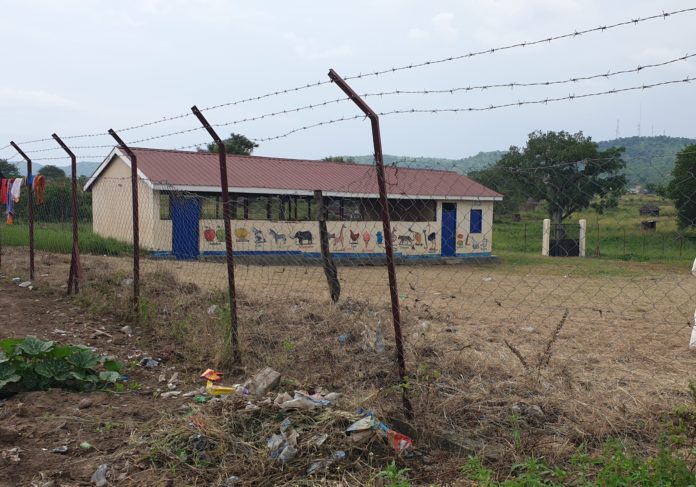
By Sebit Patrick
The National Ministry of General Education and Instruction has said it is planning to reinstate the country’s academic calendar from February to April to manage heatwave that has interrupted learning for the past two years.
This comes after the learning has been interrupted for two consecutive years following a severe heatwave caused by the emissions from greenhouse gases.
In March 2024, and February 2015, learning has been interrupted as children have been sent home over the severe heat under which learners collapsed.
This, however, not only delayed the coverage of the syllabus but also reduced the number of learners from coming to continue learning.
Clementina Kiden Arkangelo the Head teacher of Juba One Girls Primary School said she registered fewer number of learners due to the severe heatwave.
She said out of 557 learners expected in the academic year, only 313 have registered.
Kiden believes that due to the heat, parents take their own time to register their children.
“The turnout of the children this year is low because as soon as the schools open, we teach them for two weeks, so the heat started, and the government announced and gave a holiday due to the heat, because, of course, the heat was very much.” said Kiden
“Meanwhile, the parents were still registering their children, which is why the number was not very much. When they were given the holiday for the heat, the parents were supposed to come and register their children because the administration has always been open, but I don’t understand why the parents refused to come and register their children.” she adds.
“The number I registered last year was 557, but now we have registered only 313. We are supposed to have a limited time for the registration, but the parents don’t come, that is why we leave it open. We believe they will come even later because some of them are parents of continuing learners, while others are for the newcomers.” Kiden revealed
George Kenyi Wilson, another head teacher of Juba Day Secondary school said girls are affected the most as their parents entrust feeding money to them even during study time.
According to him, this has affected the girl child’s performance in school.
“When we opened on the 3rd of February, we gave two weeks for the enrolment period, and then we assessed, but when we assessed, the number we expected was maybe 20% of the capacity we wanted registered. So, by the end of February, we started, then the heatwave came, and then we were directed to close down schools for two weeks.” said George.
“I’m supposed to have 550, but I have 285 students so far. Unfortunately, the enrolment rate for girls remains low, and as teachers, we suspect that most girls are given more domestic work at home; sometimes they come with family feeding money that prevents them from attending to school assignments.” He adds.
George adds that most students struggle with the health wave, making them arrive late and sometimes miss lessons.
He said this also makes the students’ performance reduce.
“You will find that students walk long distances, and even with climate change, they reach the school when they are already exhausted. They reach school when even the first period is already over, then when they enter the school, they will find prefects and teachers on duty, they will be put to do some punishment by cleaning when already a period has passed, then they will go in and find that people have already been taught. Those things make their standards of taking knowledge going down.” He said.
Professor Peter Adwok, a medical lecturer in the school of medicine at the university of Upper Nile attributes the global warming to the use of fossil fuel which he says comes back as a backlash leading to the melting of ice in the poles.
“The globe is warming and every year the temperature is going up because of the use of fossil fuel. The fossil fuels are the diesels, you see, the benzene, the coal, and so forth, and many countries are using them all over the world, and this warms the atmosphere. This comes back as a backlash leading to melting of the ice at the poles, and that’s why we get a lot of floods, and in other places, you get droughts. Including the high heat, of course, you will understand that there is a zone around it called the Ozone layer.” said Dr Peter.
“This ozone layer is eaten away by the carbons; the smokes we produce from the industries, then there is a gap. So, the sun comes through to the earth direct and it warms it and this heat has a bad impact on the health of the people. Some people will have heat stroke, and then, because of a lot of sweating, their blood pressure gets low, and they can even collapse. This way, they will have to be rescued as fast as possible.” he asserts.
Peter asserts that previously, schools in the Sudan opened in the rainy seasons and closed in the dry season, which the weather is better
The professor, however, regrets that repairing the greenhouse effect might not be reversed in a short period.
The parliamentarian said planting trees to restore the ecosystem might be the only solution for gradual healing.
“Long ago in South Sudan or in Sudan for that matter, the schools were closed during the dry season, and as soon as you reach April, the schools are opened, so that during the rainy season, people are in the school and the weather is a little bit better. Now with this reverse, they seem to have opened or closed during the rainy season and open in the dry season, it needs a little bit of revision for that matter. It’s very difficult to repair this greenhouse impact in a short period. What you need is to plan trees where they used to be, like in Amazon and others and then the healing is done gradually.” Adwok advised.
Jackline Nasiwa, a human right defender and civil society activist who is also the executive director for Center for Inclusive Governance and Peace and Justice says the old school calendar was better.
She says issues relating to education are not only about political decisions. But environmental factors.
Nasiwa asserts that for the second time, the heatwave was supposed to be a learning point to avoid a similar closure in the future.
“Our initial school calendar was better because at least you could have a holiday up to February and then you start school in March. And that’s when maybe the rainy seasons are anticipated. So those who brought in the new policy, they should have studied first. It’s not about political decision. It’s about also the environment in which each one lives.” said Nasiwa
“And then we know that it has happened last year we still insist the school calendar should start in the same time without knowing that we cannot change nature so two times three times you know it should be a learning point and that means also the education ministries and policy makers they need to think of this so that we don’t have children interrupted in their classes we don’t have even a challenge of curriculum not being finished this climate change is not going to be changing but we can change around the climate.” the activist advised.
Nasiwa called on the government to come up with some urgent reforms to address this matter.
She urged the Ministry of Environment and the Ministry of Education to come up with options that will resolve the matter once and for all.
The activist suggested the compulsory planting of trees in schools and the community to improve the weather conditions.
“This is a priority, and it requires some urgent reforms and if they can revert, they also need to see if we revert, what is the implication, and what is the best option, either reverting or finding another solution which is in the middle ground, which can help it to align with others. So that we also don’t have like, oh, heat wave has come, children go home, they are collapsing. Why do you wait until someone collapses?” she questioned
“I think one of the things for curbing climate change, and for this matter, the heat, is planting more trees. So that if you have your home, you plant two trees, and the local leaders, who are called the village leaders make sure they check. So, if each family plants a guava tree, and maybe a mango tree, make it compulsory. Even in your gardens, in schools, if you have 100 children in your school, each one comes with two. That’s already 200 trees. And every week, they water their plant.” Nasiwa advised.
The Ministry of Education also expressed sympathy over the recurrence of the heatwave.
Tako James Moyi, the Deputy Minister of General Education and Instructions, admitted that the previous academic calendar of the Sudan was convenient.
But he said there is an Education Act in which a date was set for the official opening of the academic year.
He said for the issue of heatwave to be addressed, the ministry will present this case to the cluster on its way to the council of ministers before it would be passed into order.
“February is not the right season for opening the schools.” Tako said “You know, when we were in the former Sudan, there were three climatic regions in Sudan. Schools in South Sudan opened on the 1st of April, and schools in Eastern Sudan opened from the 1st of September. Then the rest of Sudan, 1st of July. All that brings us together is the time for the examination. It usually happens in March for secondary school examinations.”
“We had the Education Act. In that Education Act, a date was set for the opening of the schools. You know, we are also members of the East African community, and all the schools there open in February. What we will do as a ministry is to amend that Education Act, and it will not be amended by us. We have to take it to the cluster, and it is going to the Council of Ministers. Then to the Parliament. So, it is really a process.” he said
Efforts to reach the national ministry of environment and forestry for clarification on the way forward to curbing climate change was futile.
However, the ministry earlier revealed plans to plant over 6 million trees to manage climate change.
South Sudan has been experiencing severe heatwave over the past two years in what is attributed to the emission from greenhouse.
In 2024 and 2025, schools have been suspended for three weeks and civil servants were directed to work for half day to manage the heat.
This story is reported with a grant from Journalists for Human Rights under the ‘Tackling Mis/Disinformation Project,’ funded by the Peace and Stabilization Program of the Government of Canada.




